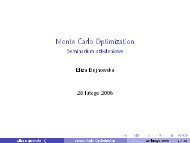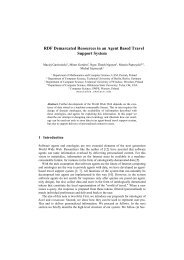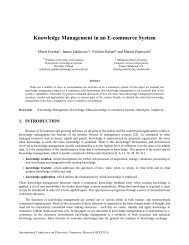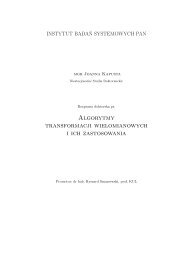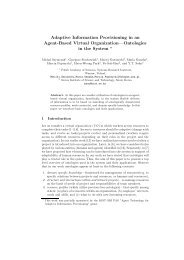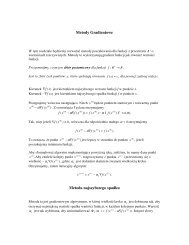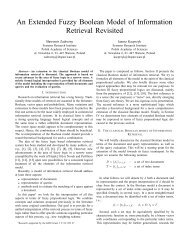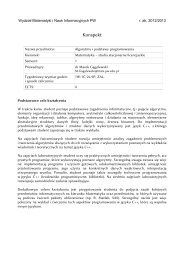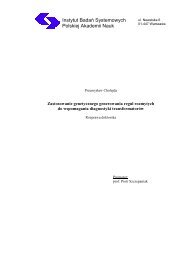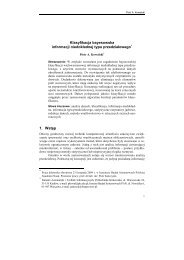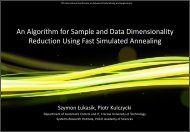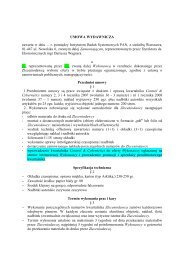Combining Information from Multiple Internet Sources
Combining Information from Multiple Internet Sources
Combining Information from Multiple Internet Sources
You also want an ePaper? Increase the reach of your titles
YUMPU automatically turns print PDFs into web optimized ePapers that Google loves.
7 http://www.calresco.org/lucas/pmo.htm<br />
8<br />
9<br />
http://home.ubalt.edu/ntsbarsh/Businessstat/stat-data/DsAppendix.htm<br />
http://www.nanyangmba.ntu.edu.sg/subjects<br />
.asp<br />
10 http://www.mises.org/story/2451<br />
# Yahoo Interia<br />
61<br />
http://www.cs.ucf.edu/~lboloni/Teaching/E<br />
EL6938_2005/slides/MultiAgent.ppt<br />
http://www.lifewithalacrity.com/social_so<br />
ftware/index.html<br />
http://www.lifewithalacrity.com/webtech/i<br />
ndex.html<br />
http://www.marginalrevolution.com/margina<br />
lrevolution/2004/05/<br />
http://www.msu.edu/course/aec/810/studyno http://plato.stanford.edu/entries/Game<br />
1<br />
tes.htm<br />
theory/<br />
http://www.cit.gu.edu.au/~s2130677/teachi http://www.ejournal.unam.mx/cys/vol03-<br />
2<br />
ng/Agents/Workshops/lecture07.pdf 04/CYS03407.pdf<br />
http://home.earthlink.net/~peter.a.taylor http://updatecenter.britannica.com/eb/art<br />
3<br />
/manifes2.htm<br />
iclearticleId=109420&pid=ursd07<br />
http://www.people.hbs.edu/mbazerman/curri<br />
4 http://aufrecht.org/blog/swcat/39172<br />
culum_vitae.html<br />
http://www.concurringopinions.com/archive http://doi.ieeecomputersociety.org/10.110<br />
5<br />
s/economic_analysis_of_law/index.html 9/TSE.2003.1237173<br />
http://dotearth.blogs.nytimes.com/2008/01<br />
/13/a-starting-point-for-productive-<br />
http://wwwstatic.cc.gatech.edu/~jp/Papers/Zagal<br />
et<br />
climate-<br />
discourse/index.htmlex=1357966800&en=2de al - Collaborative Games - Lessons<br />
6<br />
12bb5c6f809de&ei=5088&partner=rssnyt&emc= learned <strong>from</strong> boardgames.pdf<br />
rss<br />
7 http://aws.typepad.com/aws/2005/01/ http://www.kestencgreen.com/kgthesis.pdf<br />
http://www.ferc.gov/legal/maj-ordreg/land-docs/oligoply.pdf<br />
01237173.pdf<br />
http://ieeexplore.ieee.org/iel5/32/27736/<br />
8<br />
http://www.drownout.com/blog/archives/cat http://ieeexplore.ieee.org/iel5/8856/4266<br />
9<br />
_reading_list.html<br />
804/04266807.pdf<br />
http://www.indiana.edu/~workshop/wsl/game<br />
the.htm<br />
Table 4.3.1 Results of Auction method and search engines for very complex query<br />
10 http://osnews.com/comments/10354<br />
Auction Ask.com Live Interia Yahoo! Google<br />
Set Coverage 0% 0% 30% 0% 40%<br />
URL to URL 0% 0% 10% 0% 20%<br />
Table 4.3.2 Coverage of Auction method and search engines for very complex query<br />
Table above presents how result sets returned by each search engine are covered by the<br />
result of the Auction method. It can be observed that Auction method covers partially the result sets<br />
returned by Google and Interia search engine (40% and 30% respectively) and no other result set.<br />
URL to URL coverage is non-zero only for result sets returned by two aforementioned search<br />
engines. This means that large part of Auction method result set is comprised of URLs that were not<br />
in the top 10 URLs returned by many search engines. This happened due to the high dispersion of<br />
the result sets – many highly ranked URLs were eliminated during processing because of high cost<br />
of an engine which presented such URL. High cost of those URLs can be explained by the variety<br />
of results returned by search engines. There are not many URLs that are present in every set, thus<br />
resulting in lowering their chance of appearing in the final result. Final result was comprised of<br />
those URL which were not eliminated – and it appears that Google search engine had low cost<br />
during many rounds of the process. The Interia engine was a second engine in terms of URLs used<br />
in the final result. It has some different URLs than Google so it can be stated that the final result is<br />
mostly comprised of the results of those two search engines. Similar situation happened before,<br />
when dealing with the previous queries. Auction method provides its answers on result sets of<br />
separate single engines rather than taking into account URLs which are present in many engines.



